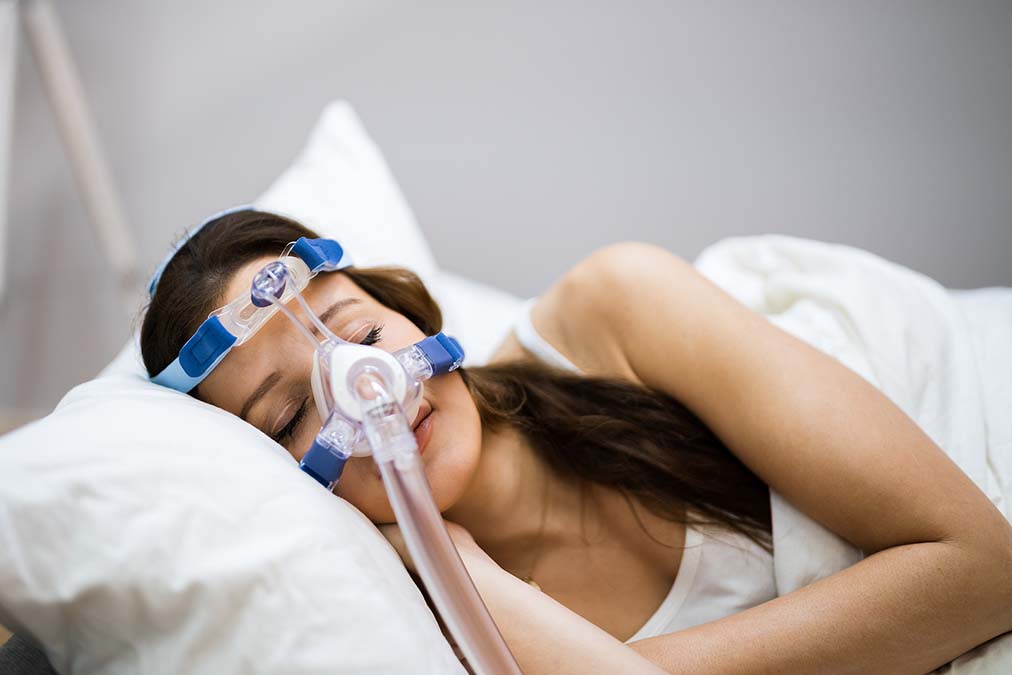 Many past studies have established that people with sleep apnea are more likely than healthy sleepers to develop heart disease and experience serious cardiovascular events like heart attacks and strokes.
Many past studies have established that people with sleep apnea are more likely than healthy sleepers to develop heart disease and experience serious cardiovascular events like heart attacks and strokes.
But surprisingly few studies investigate whether sleep apnea treatment actually reduces the risk of these events. A new study in the journal Sleep helps to address this research gap.
Researchers from the University of Kansas, the University of Pennsylvania, and Kaiser Permanente in Southern California realized that studies on the effectiveness of sleep apnea treatment against cardiovascular events were mostly short-term, so they wondered whether such treatments work over the long term to prevent these serious events.
For their investigation, they obtained information from sleep study participants for whom an apnea-hypopnea index score was available from Kaiser Permanente Southern California medical centers between 2018 and 2020. They were all free of cardiovascular disease one year before their sleep tests.
They found 13,898 people with sleep apnea who had used CPAP (continuous positive airway pressure) treatment, 20,884 people with sleep apnea who had not used CPAP treatment, and 11,145 people without sleep apnea.
They followed them for an average of 262 days; after this period, they made some important discoveries.
1. People with moderate-to-severe sleep apnea were 71% more likely than those without sleep apnea to suffer a cardiovascular event.
2. Sleep apnea sufferers who used a CPAP were 32% less likely to have a serious cardiovascular event than sleep apnea sufferers who used no CPAP at all. Those who used CPAP for at least four hours per night cut their risk by 40%.
3. Those with moderate-to-severe sleep apnea who used CPAP were 44% less likely to have a serious cardiovascular event than people with equally serious sleep apnea cases who used no CPAP.
Therefore, CPAP therapy can reduce your risk of suffering a heart attack, stroke, unstable angina, heart failure, or cardiovascular disease death. This is especially true for people with moderate-to-severe sleep apnea and for those who use CPAP therapy for at least four hours per night.
Now, from looking at the study itself, the real problem is obvious: most people can’t stand wearing a CPAP, even if it will save their life. Otherwise, the researchers couldn’t have recruited over 20,000 sleep apnea sufferers who didn’t want to wear CPAP.

 Overcoming IBD
Overcoming IBD Multiple Sclerosis
Multiple Sclerosis Banishing Bronchitis
Banishing Bronchitis Gum Disease Gone
Gum Disease Gone Overcoming Onychomycosis
Overcoming Onychomycosis Neuropathy No More
Neuropathy No More The Prostate Protocol
The Prostate Protocol Brain Booster
Brain Booster
 Ironbound
Ironbound
 Solution for Shingles
Solution for Shingles
 The Bone Density Solution
The Bone Density Solution
 The Ultimate Healing Protocol
The Ultimate Healing Protocol
 The Parkinson's Protocol
The Parkinson's Protocol
 The Chronic Kidney Disease Solution
The Chronic Kidney Disease Solution
 Overthrowing Anxiety
Overthrowing Anxiety The Fatty Liver Solution
The Fatty Liver Solution The Hypothyroidism Solution
The Hypothyroidism Solution
 The End of Gout
The End of Gout The Blood Pressure Program
The Blood Pressure Program
 The Oxigized Cholesterol Strategy
The Oxigized Cholesterol Strategy
 Stop Snoring And Sleep Apnea Program
Stop Snoring And Sleep Apnea Program
 The Arthritis Strategy
The Arthritis Strategy The Vertigo & Dizziness Program
The Vertigo & Dizziness Program The 3-Step Diabetes Strategy
The 3-Step Diabetes Strategy Hemorrhoids Healing Protocol
Hemorrhoids Healing Protocol The Erectile Dysfunction Master
The Erectile Dysfunction Master Weight Loss Breeze
Weight Loss Breeze The IBS Program
The IBS Program The Insomnia Program
The Insomnia Program The Migraine and Headache Program
The Migraine and Headache Program The Neck Pain Solution
The Neck Pain Solution The Menopause Solution
The Menopause Solution The Ejaculation Master
The Ejaculation Master The TMJ Solution
The TMJ Solution The Acid Reflux Solution
The Acid Reflux Solution The Fibromyalgia Solution
The Fibromyalgia Solution The Psoriasis Strategy
The Psoriasis Strategy